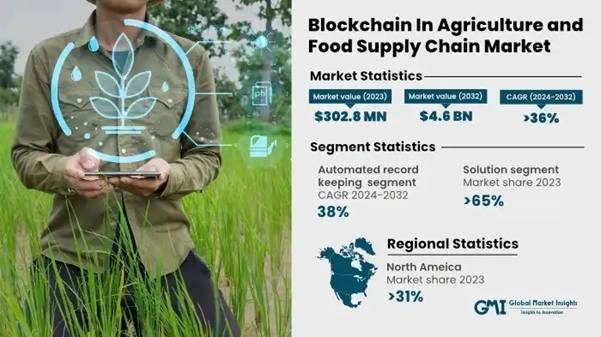Blockchain market share in agriculture and food supply chain will reach a CAGR of 36% from 2024 to 2032, fueled by the growing demand for transparency and traceability in food supply chains, coupled with the growing consumer demand for provenance. Consumers are increasingly seeking assurance about the origin and journey of their food products, prompting businesses to embrace blockchain technology for its ability to provide immutable records and real-time traceability. This move towards transparency helps build trust, ensures product quality and supports regulatory compliance, thereby fueling market growth.
For example, in October 2022, BASF Agricultural Solutions launched a “Seed 2 Sew” pilot using blockchain to trace sustainably grown FiberMax(R) cotton from seed to final product, addressing the complexity of supply chains. cotton supply. This initiative highlights the potential of technology to address sustainability and supply chain management challenges. As companies like BASF implement blockchain solutions, this demonstrates the growing importance and integration of blockchain technology in improving agricultural supply chains and product traceability.
Blockchain in the agriculture and food supply chain sector is divided based on type, application, technology, end user and region.

The food supply chain tracing segment will witness a notable increase between 2024 and 2032 due to its critical role in ensuring transparency, traceability and security. Blockchain technology enables precise tracking of food products from farm to table, helping to prevent fraud, reduce waste and improve quality control. As consumers and regulators demand greater accountability and transparency in the food supply, the need for robust tracing solutions supported by blockchain technology continues to grow.
The food manufacturers segment will see a sharp recovery through 2032, propelled by their central role in production and distribution. Blockchain technology provides food manufacturers with improved visibility, traceability and efficiency, enabling better management of supply chain processes and quality control. As manufacturers seek to optimize operations, reduce costs and meet regulatory requirements, the adoption of blockchain technology is becoming increasingly crucial to ensuring transparency and integrity in the food supply chain.
MORE BY GLOBAL MARKET OVERVIEW
The European blockchain market share in agriculture and food supply chain will reach a notable CAGR from 2024 to 2032, attributed to its advanced technological infrastructure, strong regulatory frameworks, and significant investments in food safety and traceability. The region’s focus on transparency, quality control and sustainable practices is driving the adoption of blockchain technology. Additionally, European governments and organizations are actively supporting digital transformation in agricultural and food supply chains. Europe’s progressive approach and regulatory environment positions it as a crucial contributor to market expansion.
0
1
5
The new era of agriculture: Blockchain technology is a game changer




